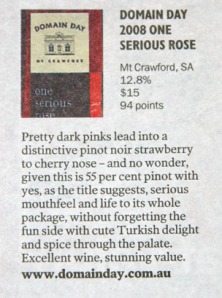
There is an adage; there are no great wines, only great bottles of wine.
How do we know when we have found that great bottle, much less, how do we increase our chances of picking out that great bottle from the myriad choices. Many people are happy with a simple point system, but to me, this tends to dumb down the experience of wine. While it may help guide you towards picking a better bottle, a point scale says nothing, absolutely nothing, about a wine, the actual experience of drinking it. I’ve never heard anyone say, “that’s some good 94 points.” This is why consumer education, or better yet, a developed culture of appreciation (for food as well as wine) is so critical.
Beyond a point scale, tasting notes do little better for describing the quality of wine. They may describe the qualities of a wine, but do not speak to the overall experience. I came across this in “Wine Science” by Ron S. Jackson:
“Regrettably, the use of wine descriptive terms can become perceived as an essential component of wine appreciation. Once tasters have developed sufficient experience with wine, the description of wine in terms of fruit, flowers, vegetable, and so on - except for research purposes in the descriptive analysis of wine - becomes unnecessary and counterproductive. In addition, it can degenerate into an exercise in self-fantasy. Quixotic terms may be invented to describe fleeting, imagined perceptions. It is generally more meaningful to characterize wines by their production style, varietal origin, and aging process.”
The difficulty with these broader characterizations, and assessments of quality, is the subjectivity of taste, and the variability of experience and knowledge. Appreciation of wine, is like that of art or music; we are often rewarded when we begin to appreciate its qualities beyond the surface elements. Jackson outlines a set of criteria for examining a wine which I find relevant and useful. The key term he uses is “Assessment of Overall Quality”. Chief among these is the wine’s memorableness - does the wine hold our interest, does it create an impression on us. This could be due to factors such as its sense of balance, its complexity, its development or its duration. This reinforced the notion that dissecting a wine’s flavors can do a disservice to the wine by reducing it to parts less than the sum total. If we want to say anything meaningful about a wine, we must remember that wine can tell a story, so we must in turn tell the story of the wine.
How do we know when we have found that great bottle, much less, how do we increase our chances of picking out that great bottle from the myriad choices. Many people are happy with a simple point system, but to me, this tends to dumb down the experience of wine. While it may help guide you towards picking a better bottle, a point scale says nothing, absolutely nothing, about a wine, the actual experience of drinking it. I’ve never heard anyone say, “that’s some good 94 points.” This is why consumer education, or better yet, a developed culture of appreciation (for food as well as wine) is so critical.
Beyond a point scale, tasting notes do little better for describing the quality of wine. They may describe the qualities of a wine, but do not speak to the overall experience. I came across this in “Wine Science” by Ron S. Jackson:
“Regrettably, the use of wine descriptive terms can become perceived as an essential component of wine appreciation. Once tasters have developed sufficient experience with wine, the description of wine in terms of fruit, flowers, vegetable, and so on - except for research purposes in the descriptive analysis of wine - becomes unnecessary and counterproductive. In addition, it can degenerate into an exercise in self-fantasy. Quixotic terms may be invented to describe fleeting, imagined perceptions. It is generally more meaningful to characterize wines by their production style, varietal origin, and aging process.”
The difficulty with these broader characterizations, and assessments of quality, is the subjectivity of taste, and the variability of experience and knowledge. Appreciation of wine, is like that of art or music; we are often rewarded when we begin to appreciate its qualities beyond the surface elements. Jackson outlines a set of criteria for examining a wine which I find relevant and useful. The key term he uses is “Assessment of Overall Quality”. Chief among these is the wine’s memorableness - does the wine hold our interest, does it create an impression on us. This could be due to factors such as its sense of balance, its complexity, its development or its duration. This reinforced the notion that dissecting a wine’s flavors can do a disservice to the wine by reducing it to parts less than the sum total. If we want to say anything meaningful about a wine, we must remember that wine can tell a story, so we must in turn tell the story of the wine.
No comments:
Post a Comment